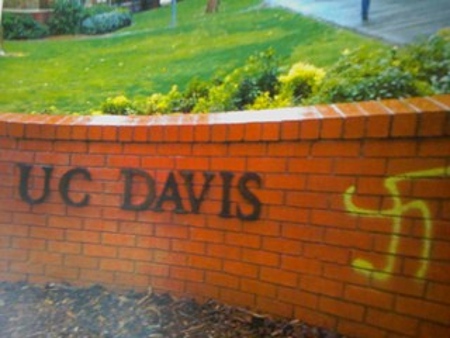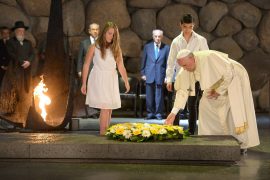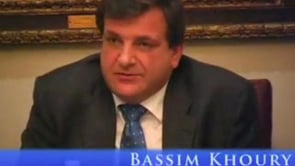This essay was written by Daniel Vahab
 Did you know that, until recently, Jews lacked the same civil rights protections on college campuses that is afforded to Arab Americans, African-Americans, and Hispanic Americans, to name just a few?
Did you know that, until recently, Jews lacked the same civil rights protections on college campuses that is afforded to Arab Americans, African-Americans, and Hispanic Americans, to name just a few?
That was until Kenneth L. Marcus, former head of the U.S. Department of Education’s Office for Civil Rights (OCR), and others lobbied to revise the Title VI policy of the Civil Rights Act of 1964. In 2004, as head of OCR, he revised—or “clarified”—the policy which he said always meant to apply to Jews, too, but technically didn’t because of a legal loophole.
The loophole stemmed from the fact that OCR classified Judaism as just a religion, and not a race or ethnicity. Religion is not protected under Title VI. And so, Jewish students who suffered discrimination and harassment on federally funded universities (even most private institutions receive at least some government funding, said Marcus) were not able to receive the standard protection of resources and support, and have their complaints investigated by the university.
Jewish students who reported such incidents were previously told by the campus that it basically couldn’t do anything, and that the student could either go through the process of getting an attorney and taking her complaint to the federal courts or take her complaint to the justice department, which Marcus said “wasn’t interested in pursuing these cases.”
Thus, Marcus was tasked with convincing OCR that Jews are indeed an ethnicity. But, he said, what was really relevant was for him to show that the manifestation of antisemitism often sees Jews as an ethnicity and that because of this reason the law needed to include Jews along with other protected groups.
Now, a school is legally obligated to take action upon being notified of antisemitism that falls under the jurisdiction of Title VI—lest it lose millions of dollars in federal funding that it relies on.
To combat the campus antisemitism, Marcus recently formed the Louis D. Brandeis Center for Human Rights Under Law.
Simply put, the Brandeis Center is “saying these are the laws that exist and these are the laws that protect our students. They protect Jews. They protect non-Jews,” said Rabbi Akiva Tendler, director of the Fellowship for Campus Safety and Integrity.
“Until now,” said Marcus, “there have been a lot of organizations that have been putting together complaints in a sort of scattershot way, but no single institution formed for this purpose. My hope is that the Brandeis center will bring centralized expertise to a very serious national and international problem.”
And it is indeed a problem. Consider this statistic: more than 40 percent of Jewish students experience antisemitism on college campuses, according to a recent study by the Institute for Jewish & Community Research. This means that for every five Jews, two report having experienced antisemitism on campus. The study “Alone on the Quad: Understanding Jewish Student Isolation on Campus,” polled more than 1,400 students nationwide.
And while “classic” antisemitism that focused on stereotyping, discriminating Jews, and attacking the Jewish religion still exists on campus, several experts I spoke with said the new antisemitism on campus mainly involves Israel, which is attacked as a vehicle for persecuting the Jew, en masse. Examples include a speaker, a professor, or a school-sponsored conference that likens Israelis or Zionists to Nazis and Israel to a genocidal state or Apartheid South Africa.
“The university,” said Richard Cravatts, president of Scholars for Peace in the Middle East, “would not allow members of the Ku Klux Klan to have a rally on their campus. And you can be sure that black kids would be screaming bloody murder, that this would be intimidating for them, as well they should. If the university did nothing there would be Title VI lawsuits because they are creating what we would call a hostile environment for those black students. The same thing could be said for Jewish students, who at the University of California at Irvine … have to hear Imam Amir Abdul Malik Ali come to campus and talk about the new Nazis being the Jews. And how the Jews control the press and the Zionists are murderers. And the Zionists do this and that. And they are controlling American politics and all of those lies.”
For Jewish students who “identify with the state of Israel, it’s very difficult for them to speak out against [the new antisemitism] because these are the same professors that give them their grades, give them their recommendations, that determine in many ways their future and they would rather either drop the class or keep their mouth shut than to complain or to make trouble,”said Tammi Rossman-Benjamin, cofounder of the Investigative Task Force on Campus Anti-Semitism. “And so it becomes a very discriminatory experience because no other student has to compromise their educational experience because of what happens in the classroom.”
“The administration,” added Tammi, who lectures at the University of California Santa Cruz, “either turns a blind eye to what’s happening on the campus square or in the classroom, or the administrators themselves are actually perpetrating this, which we have in California campuses.” She offered the example of how Harold Hellenbrand, the interim president of California State University at Northridge, who as provost and vice president had signed an open letter to CSU Chancellor Charles Reed that likened Israel to an apartheid racist nation and asked that the Israel study abroad program at his university not be reinstated.
What about the notion of academic freedom? To this question, Tammi said, “If you’re talking about academic freedom then really you’re talking about faculty. Are faculty allowed to use academic freedom to say racist and antisemitic things? I say not. And it’s not even a legal issue. It’s a professional issue … It’s allowing you to teach your subject without interference from the government, from religion, from the outside. But the line is crossed when you use the university as a pulpit for your own political, partisan agendas. Then you’re not pursuing scholarship. You’re not pursuing truth and knowledge.”
Marcus, who has been combating the hate on campus for more than a decade now, says he only recently started to file complaints. He said the center’s research-funding component deals mainly with “legal and public policy research” and that it also plans to host a forthcoming conference on campus antisemitism and that he will serve as guest editor to an issue of The Journal for the Study of Antisemitism dedicated to campus issues. Other examples in which the center educates people on campus antisemitism include through op-eds, lectures, and social media, said Marcus.
Besides funding, one of the biggest stumbling blocks facing the center, said Marcus, is the 180-day deadline by which OCR requires a case to be filed from when the incident occurred. The center is tasked with finding cases, and helping in the process of investigating and then filing them, which takes a lot of time.
Asked why, given his distinguished law background, he chose to take the non-profit advocacy route over lots more money at a high-profile law firm, Marcus admitted that he was a partner in such a firm before, but said that he “feels that the Louis D. Brandeis Center is doing critically important work which I really feel called to do.” He added that he is “really concerned that if we don’t act forcefully now that the situation could deteriorate on college campuses.”
Related articles
- Anti-Zionism is Racism (An essay by Judea Pearl) (cifwatch.com)
- Berchmans or Ben White? Deep thoughts at ‘Comment is Free’ on why Jews are hated (cifwatch.com)
- Guardian’s false accusation of “false accusations of antisemitism” (cifwatch.com)
- Guardian publishes letter by supporter of Gilad Atzmon, refuses to publish rebuttal (cifwatch.com)
- Arthur Nelsen’s Occupied Mind: Why the Guardian Left can’t take Arab antisemitism seriously (cifwatch.com)
- Antisemitism below the line at CiF: Jewish control of US policy, & Jews’ insidious practice of usury (cifwatch.com)
- Perpetrators as victims: Seumas Milne ignores Islamist-inspired antisemitism of Toulouse massacre (cifwatch.com)
- The Big Lie Returns (cifwatch.com)
- Guardian reader on those uppity British Jews exercizing their political rights (cifwatch.com)
- Muslim Anti-Semitism, Israel, and the Dynamics of Self-Destructive Scapegoating (cifwatch.com)




